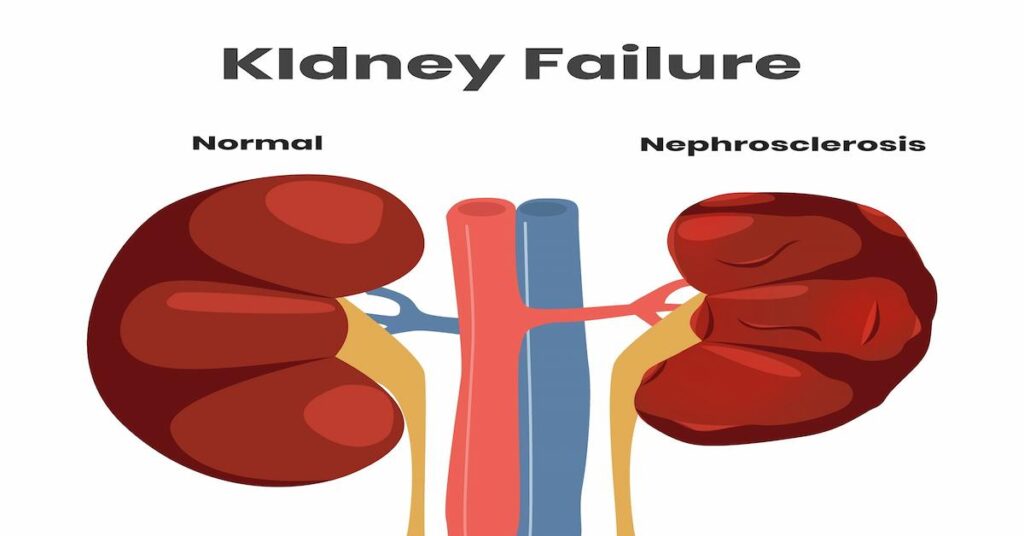What is kidney failure?
When one or both of the kidneys fail to function and can no longer work on their own, it is called kidney failure. This condition is also known as renal failure.


Credits: vascularcures
Sometimes, kidney failure occurs temporarily, and if not treated properly, it can become chronic. The treatment of total kidney failure is dialysis and kidney transplantation.
What is the work of kidneys in our body?
Both the kidneys do several functions in our body. The most important task of the kidney is to eliminate toxins from our bodies. The kidneys filter our blood and excrete the waste out of our body in the form of urine.
The shape of kidney is bean-shaped and is about the size of our fist. Kidneys are located under the lower part of the ribcage. Every person has two kidneys but a person can live as long as one kidney is working correctly.
Waste materials build up in our bodies when kidneys don’t work efficiently. This waste material build can cause other serious illnesses.
What are the causes of kidney failure?
Diabetes and high blood pressure are the most common causes of kidney failure.
When kidneys stop functioning suddenly(within hours or days), it is called acute kidney failure/injury. Acute kidney failures are generally temporary and can be treated.
Common causes of acute kidney failure or injury include
- Autoimmune kidney-related diseases.
- Specific medication that causes harm to kidneys.
- Extreme dehydration.
- Obstruction in the urinary tract such as stones.
- Other diseases such as heart diseases and liver diseases.
Chronic kidney diseases don’t happen overnight. Kidney failures are related to many other health conditions such as heart disease and diabetes.
Causes of chronic kidney diseases
Diabetes: a diabetic person has more sugar levels in their bloodstream, and if not managed it causes organ failure including kidneys.
Hypertension: High blood pressure causes kidney failure because the pressure of the blood passing through the kidneys is high.
Symptoms of kidney failure
In the early stages of kidney failure, people experience few or no symptoms. People may feel fine but chronic kidney disease can cause serious damage to the kidneys.
- Extreme fatigue.
- Dysentery and frequent vomiting.
- Swollen body parts especially hands and ankles.
- Frequent urination.
- Muscle pain.
- Less feeling of hunger.
kidney failure diagnosed
There are several ways to measure the functioning of kidneys. Some of the methods of diagnosing kidney failure are
Blood test: A blood test of a person suffering from kidney disease can show how well the kidneys are removing the waste from the blood.
Imaging of the kidneys can show if there is any obstruction or abnormalities in the kidneys.
Urine test: a urine test helps doctors measure the amount of urine or any other specific substance such as protein or blood in the urine.
FAQ’S
What are the symptoms of kidney failure?
Symptoms of kidney failure are,
1. Extreme fatigue.
2. Dysentery and frequent vomiting.
3. Swollen body parts especially hands and ankles.
4. Frequent urination.
5. Muscle pain.
6. Less feeling of hunger.
What are the Common causes of acute kidney failure?
Common causes of kidney failure are,
1. Autoimmune kidney-related diseases.
2. Specific medication that causes harm to kidneys.
3. Extreme dehydration.
4. Obstruction in the urinary tract such as stones.
5. Other diseases such as heart diseases and liver diseases.
How is kidney failure diagnosed?
Blood test:
A blood test of a person suffering from kidney disease can show how well the kidneys are removing the waste from the blood.
Urine test:
A urine test helps doctors measure the amount of urine or any other specific substance such as protein or blood in the urine.
